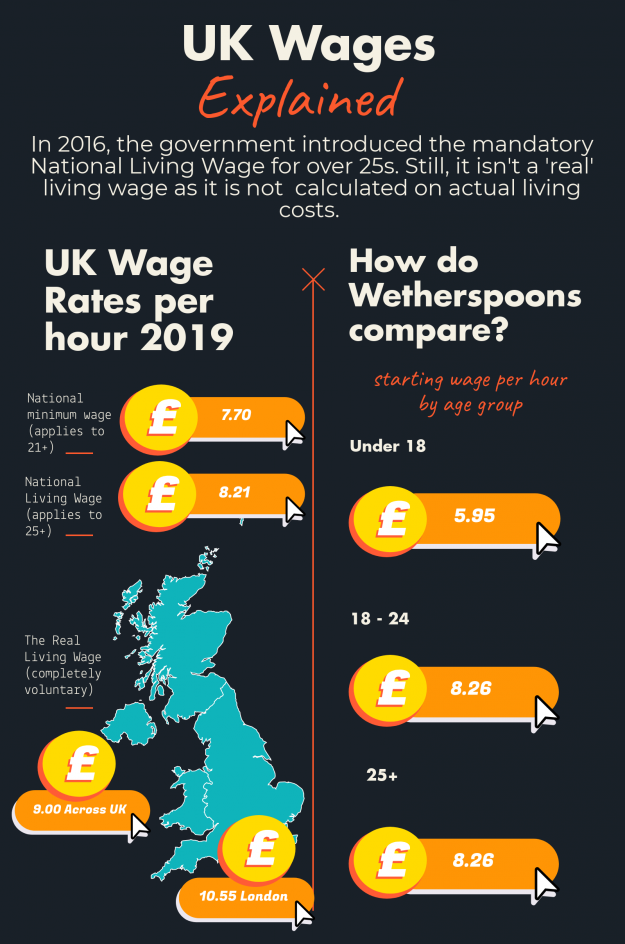A change in pay rates saw profits plummet for the national pub-chain, J.D. Wetherspoon. InterCardiff examines whether ‘Spoons’ pay their employees enough.

One Cardiff Wetherspoon bar associate described how they had to clean a bathroom stall so completely covered in human waste you’d be hoping for a hazmat suit before tackling the job. Along with the occasional abusive customer and regularly working well into the early morning, it can be tough work for a low wage.
Cardiff boasts eight ‘Spoons’, and the pub-chain has been in hot water over their pay recently. Employees of Cardiff’s Wetherspoons weren’t too damning of their wages. “There’s not many hours going around,” one Cardiff bar associate explained, “But it’s not like the pay is bad.”
Still, Tim Martin, the eccentric CEO of the pub-chain and lookalike for ‘Doc’ from Back to the Future has been under fire as Wetherspoons pubs don’t pay their employees the real living wage.

The Living Wage Foundation is an organisation that calculates the what the real living wage actually is, and then accredits businesses that pay them. “Paying the living wage is important as it is a rate independently calculated by the cost of living which can help to pull families out of in-work poverty.” Said Bethan Harvey, the Living Wage Accreditation Officer in Wales, “It also improves well-being, health and allows more time for leisure and family.”
The ‘living wage’ sounds like a straightforward term, but it’s been bogged down by bureaucratic redefining. As James Karren, the owner of the recently real living wage accredited St. Canna’s Ale House in Cardiff explained, “They have increased… the minimum wage, and started calling it the living wage, which is why the Living Wage Foundation adopted the term ‘real living wage’ because it’s calculated on the actual cost of living.”

The minimum wage applies to under 25s, and the marginally higher ‘living wage’ applies to over 25s, but neither are actually based on the cost of living unlike the voluntary, ‘real living wage’.
Guardian columnist, Owen Jones recently stated in an interview with Tim Martin, “It’s [Wetherspoons pay rate] below the living wage by definition,” and on this charge he was mistaken. Wetherspoon’s minimum starting rate for all employees over 18 is higher than the government mandated living wage, which must only legally be applied to over 25s.
“The rate of pay went up for everybody,” one Cardiff bar associate explained, “Its recently gone up 10p because I’ve got a year’s service, and it went up again, it went up in November 5.”
The pub-chain’s half-year earnings report published on 15 March stated that their profits have plummeted by 19%. A major factor in the pub-chain’s profits slump was actually the Wetherspoons-wide pay increase for all staff not on salary that occurred in November last year.
This may not have been done out the kindness of Martin’s heart. As another Cardiff bar associate pointed out, the wages went up after a strike in Brighton threatened to escalate into national action. However, he also added, “Every hour after midnight the pay also went up by a full £1. It is pretty good, especially for the larger pubs where we’ll be closing down until early in the morning.”

Martin is still a long way from paying his employees the real living wage. The 89 accredited Living Wage employers in Cardiff include large organisations like national banks, and as James Karren said, ““I imagine that the Wetherspoons, is a kind of like, big business that has potentially got the backing and the capital to be able to [pay their staff the real living wage].”
Undoubtedly, it’s important that the big businesses that can afford to pay real living wage, do. Lola McEvoy, Senior Campaigns and Communications Manager for the Living Wage Foundation said that when more employers pay the real living wage, “Thousands of people get a pay rise, but other local employers also follow their lead. If more large employers step up, we can start to build true Living Wage places.”
However, it may be more complicated than it first seems, “I suppose for a big business it’s quite a comprehensive thing to have to do,” said James Karren, “Because it’s got to be every member of staff directly or indirectly employed… For example, a big business was paying, or employing, a secondary cleaning company to clean properties, I think The Living wage Foundation want you to affirm that those cleaners are also getting paid living wage.”
James explained that as a smaller independent business with few staff, he’d always intended to pay his employees that bit more. As a result, “It’s easier to build it in to all your budgeting and things.” ‘Spoons’ doesn’t pay the real living wage, but as James went on to say, “I think… for businesses, to later on, try to force in it it’s probably a harder thing to do.”
Ideally, all companies would pay the real living wage, but it might be more difficult than it first seems for company as big as J.D. Wetherspoon to implement a pay rise for all employees. They still have a way go with fair pay, but as one Cardiff Wetherspoons employee summed up, “I can get by, but not have much left over… I feel like I could do with a bit more, but I don’t think it’s unfair compared to other pub companies, they’re payed a lot less.”

